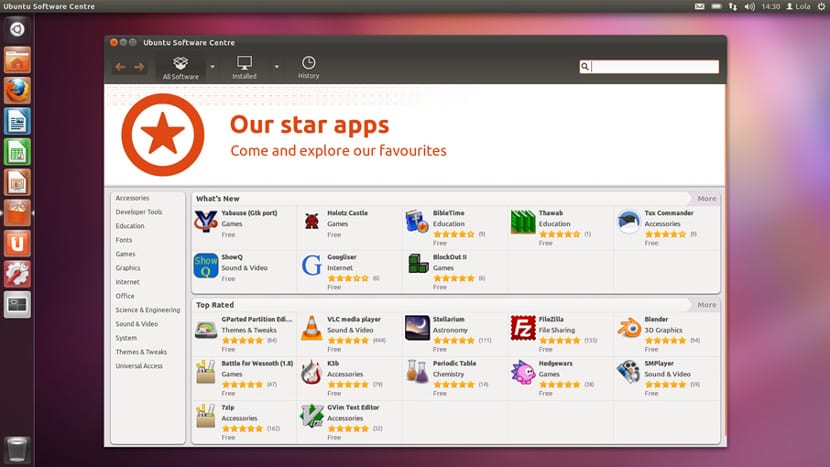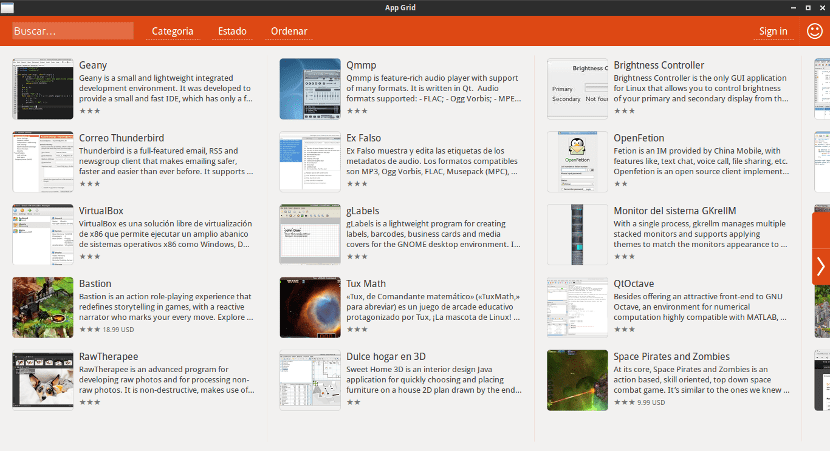
These are not good times for the Ubuntu Software Center. We first learned from Phoronix that Ubuntu MATE has stopped using USC, and as we have been able read on Softpedia the developers of this program would be willing to give up the exclusivity of the Ubuntu Software Center in favor of GNOME Software.
However, and as pointed out in MuyLinux, the Ubuntu Software Center it's slow, heavy, and has an outdated interface. For the user who has just arrived at Ubuntu, it is very good: It does its job, it is there and allows visual access to the programs we want to install on our computer.
Now, all that glitters is not gold: In the Ubuntu Software Center many repositories are missing that the user must add manually - something that is common to other stores Ubuntu-, there are programs that are outdated and will not be updated soon and, in general, the user experience is terrible. It is a very slow and heavy tool, and anyone who has had to use it on a computer with more or less fair features knows it.
For advanced users there is the option to use the always reliable Synaptic, but not everyone knows what packages to search for by name. Unlike the Ubuntu Software Center, Synaptic is not for everyone. What would be the logical choice? You can install Muon Discover, for example, and with it a lot of Qt libraries, but still Muon does not find packages that the Software Center does - or so it was in old versions of Kubuntu, I could be wrong.
AppGrid: The best alternative?

It has been a long time since the Ubuntu Software Center disappeared from my computer, maybe never to return. It must be recognized that, at least, it leads that way. I've been using AppGrid for a few versions when I want to install one app graphically, although it is true that in most cases I use PPAs.
Why do I prefer AppGrid to Ubuntu Software Center? First, because it's fast and light. It doesn't take forever to open it from the laptop I use for work, and I can search for a program without risking AppGrid crashing. It has the advantage of replicate the Software Center repositories, with which what you can find in one place you will have in the other.
Second, I prefer AppGrid to Ubuntu Software Center for having a more refined interface In my opinion, where it is easier to find what you are looking for and interact with other users when it comes to leaving impressions about the different programs.
Still, AppGrid it also does not save itself from the evil of outdated packages suffered by the Ubuntu Software Center. For example, the only way I have found to have the Ardor digital audio station in its latest versions has been to install Ubuntu Studio. Both must get started when updating packages, especially for the sake of convergence, which leads us to the next point in this article.
What should Canonical do with the Ubuntu Software Center?

It is said that in Canonical you are looking for convergence between devices as they have achieved in Microsoft with Windows 10, something that we already discussed yesterday in our article comparing Windows 10 and Ubuntu. In Ubuntu they are looking for a single core for all devices in 2016 and there is talk that the Ubuntu Touch application store will be the one that will replace the Software Center as a solution to find and install programs.
This idea is not entirely far-fetched. Let's not forget that with an Ubuntu Touch phone you carry a perfectly functional Ubuntu in your pocket, which implies that you can even add PPAs or use the terminal to do administrative tasks in the terminal. Now the Ubuntu convergence opportunity came with Ubuntu One and they missed the train when they removed the service, which has meant that Microsoft has won the game with OneDrive and Windows 10, although this is another debate.
If Canonical really is betting on convergence, then the Ubuntu Touch app store should replace Ubuntu Software Center. It is the most logical thing, since perhaps then we would have a balanced operating system that on the one hand has its local applications of all life, and on the other hand it has webapps like the ones in Ubuntu Touch that you can take advantage of. And since Canonical is focusing its efforts on Ubuntu Touch, maybe we would remove some of the evil from outdated packages.
Be that as it may, there is no doubt that Ubuntu Software Center is not as relevant anymore. Many users dismiss it and recommend against using it, and Canonical has its sights set elsewhere right now. Perhaps it is time to renew or die, and perhaps adopt a single app store for all your devices is the best way to solve this problem.
What do you think? Leave us a comment with your impressions.
to renew and make it lighter.
I correct, I use synaptic XDDDDDDDD
I just had a disastrous experience with it. I'm going to try the AppGrid to see, because it has made me dust ...: _ (
Both the Center and Synaptic have good points. That they improve it, but that they do not take them out
It is very useful but can be improved
It would be useful to renew both
It has to be lighter, it is good but it still lacks
Renew and streamline
What mix the android apps
Android and ubuntu mobile apps
Definitely RENEW.